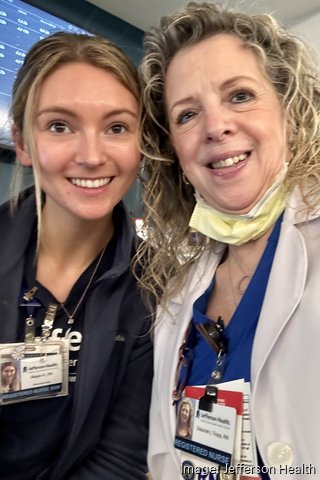Listen to this article 6 min
Debbi Tropp was content in her first year of retirement after spending more than five decades as a nurse, including her last 20 at Jefferson Health in South Jersey, when she received a letter at her Cherry Hill home two years ago.
The letter was from Jefferson's chief nursing officer.
"I was a little hesitant to open it because i thought I'm an alumnus now and they are probably asking me for money," Tropp joked.
Instead, the letter explained Jefferson was launching a program offering retired Jefferson nurses the opportunity to return as mentors.
Through the Nurse Emeritus program, initiated in 2022 during the Covid-19 pandemic, Jefferson rehires retirees to work with nurses who are new to the professional and help them hone their skills.
Jefferson said this week it is expanding the program, which so far has only been used by its South Jersey hospitals in Cherry Hill, Stratford and Washington Township, to include potential hires from outside of the Jefferson health system.
Tropp, who will celebrate her 72nd birthday in June, was the first to sign up for the program when it began two years ago.
“Once a nurse, always a nurse,” Tropp said. “It’s a tremendous opportunity for me to both share my knowledge and to also learn new things. … I absolutely love it.”
Marilyn Goodman, the New Jersey nurse emeritus program coordinator, said more than 12 nurses who had retired within the past three years — a requirement of the program — have joined the Nurse Emeritus team in New Jersey. They work everywhere from medical-surgical floors to neonatal intensive care units to the Sidney Kimmel Cancer Center in Washington Township.
The program, Goodman said, offers retirees an opportunity to re-enter the workforce and offer their experience and guidance to the "new-to-practice" nurses they mentor. The nurse emeritus participants do not work full-time or perform hands-on clinical care and instead assume an education-based role.
“We’ve had great success with our Nurse Emeritus Program and we’re ready to take it to the next level,” said Goodman, who called the program a "win" for retired nurses and current RNs alike.
A major goal of the program is to help new hires and create a supportive environment that will enable Jefferson to retain nurses at a time when health care providers of all sizes are having difficulty filling vacancies. A shortage of nurses has forced hospitals and health systems to spend millions of dollars on high-priced agency nurses and for improved wages to retain their permanent nursing staff.
In the first half of its 2024 fiscal year, Jefferson was able to reduce its spending on temporary staffing by $30.5 million but still saw its costs for salaries and wages increase by 2.3% during that six-month period ended Dec. 31.
Now Jefferson is looking into expanding the Nurse Emeritus Program more actively in Pennsylvania, according to a health system spokesperson.
In addition to having been retired three year or less, requirements for those interested in joining the Jefferson program in New Jersey include an active New Jersey nursing license and a commitment to working a minimum of eight hours a month.
Training is provided to Nurse Emeritus Program participants before beginning the role, and nurses can select the floor or unit where they feel their skills will be the best fit.
Tropp works 10 hours a week at Jefferson Cherry Hill Hospital, a few minutes from her home, on a medical-surgical floor — a change from how she spent most of her time at the hospital working previously in same day surgery and the surgical recovery units.
So far, she has worked with six “new-to-practice” nurses through the program.
“I'm their go-to person,” Tropp said. “I guide them in the processes of time management and clinical decision-making. I don’t hover. I want them to come to me if they have a question and we solve it together.”





